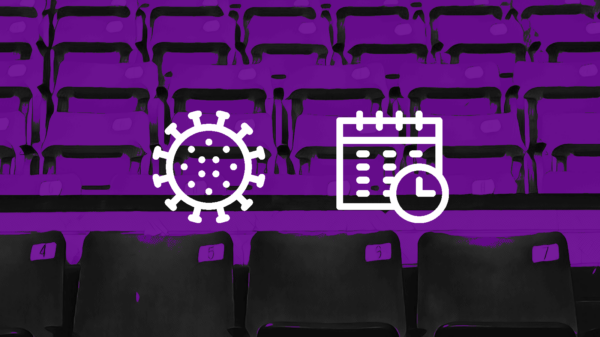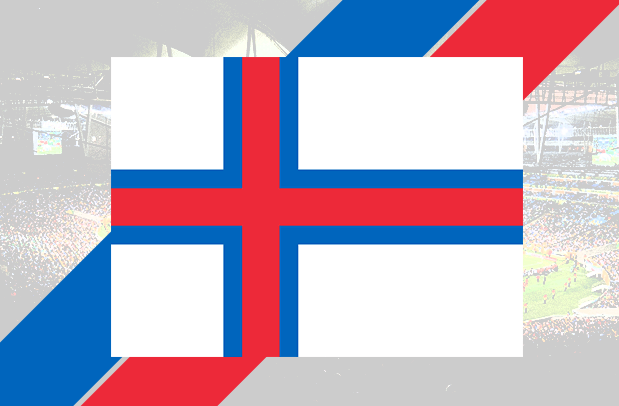Ryan Power writes about the UEFA Nations League and why it’s a good thing.
Everybody hates meaningless international friendlies.
You know, the ones which The FA put on at Wembley to generate millions in revenue for their coffers.
They are largely hated as they serve no positive purpose on the whole. The players typically can’t be bothered to put in the same level of performance – in case they get injured or return to their clubs tired – and the fans often have to sit through mass player rotation resulting in a far from meaningful spectacle.
And all this for what? There’s no glory in beating an experimental Norway side on a damp Tuesday night in North West London.
But you see we have to have them. Even though nobody likes them. A bit like politicians.
Until now, it seems.
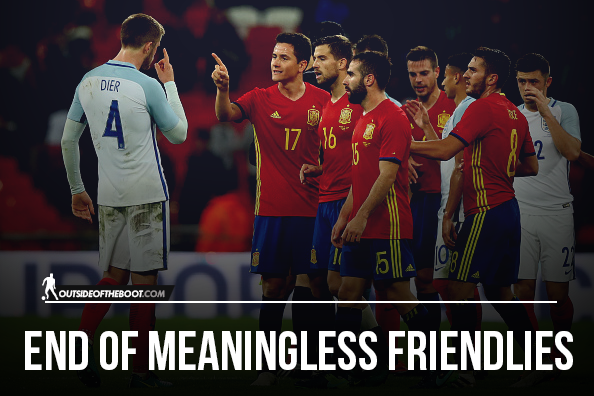
You see the good people of UEFA have done something positive for football. They’ve only gone and introduced a new competition which will as good as rid Europe for ever of the meaningless international friendly.
Introducing…. *awaits drum roll*
So it turns out that relatively new UEFA president, Aleksander Čeferin, wants to make an impact in his new job. The Nations League stems from his desire to “improve the quality and standing of national team football.”
Additionally, according to UEFA, “there is also the desire from the associations for more sporting meaning in national team football, with associations, coaches, players and supporters increasingly of the opinion that friendly matches are not providing adequate competition for national teams.”
What you might not have realised was that UEFA have been quietly beavering away at this plan since as far back as 2011. They have also announced that it’s no longer a pipeline dream.
This is a thing, it’s happening and it’s happening next year.
Oh, and not only is there a going to be a fancy new trophy to play for, and a new mini tournament every other year but this will also affect qualifying for future European Championships.
So, yeah, kind of a big deal.
This does rather beg the question of why there’s every chance that you’ve heard nothing about it yet. Well, that I cannot answer, sadly. Other than that because the PR office of UEFA is possibly still stuck in 1984.
No doubt the mainstream media will cotton on at some stage, Sky Sports have already paid £200m for the rights to show the matches, so presumably they’ve heard of the competition.
So, How Does The Nations League Format Work?
Well, all 55 European nations will be ranked from 1 to 55, based on the UEFA national team coefficient rankings (more on those in a moment).
The top twelve of these sides will make up League A, the next twelve make up League B, the next fifteen make up League C and finally the bottom sixteen make up League D.
Leagues A and B are then split into four groups of three teams. League C is split into one group of three and three groups of four and finally League D is split into four groups of four.
Still with me? Great.
Here’s where the fun starts. You play each of the other two (or three) sides in your group home and away. These fixtures replace most of the previous meaningless friendlies in the international calendar.
Remember you’ve already been paired with teams of a similar ranking so the idea is that these games should be competitive and should improve standards across the board.
If you come top of your league then you get promoted for the next tournament. Finish bottom, you get relegated. Just like a proper league system!
But wait, there’s more.
The four group winners from League A go into a special Final Four Competition, which is basically the semi-finals onwards of a mini tournament. Played every two years!
This infographic from UEFA will explain it better than I just have, most probably.
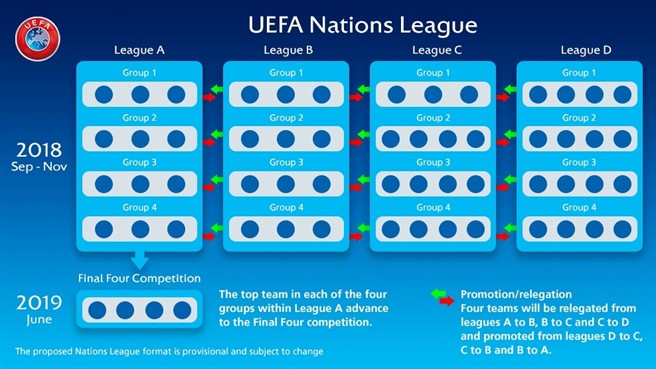
So just to reiterate on the last point, that means – for some nations anyway – tournament football
every summer! You’ll have the Final Four Competition every year that there isn’t a World Cup or European Championship. Personally, I think that’s a wonderful development as going to a tournament is just about the most exciting thing you can do as a football fan.
Which Leagues Will The Home Nations Be In?
As touched upon earlier, the initial groupings will be based on the UEFA national team coefficient rankings. So as things stand today that would make the twelve League A countries; Germany, Russia, Belgium, Portugal, Spain, England, Italy, Switzerland, Croatia, Poland, France and Iceland.
So England would make it into League A, as things currently stand.
Wales are ranked 15th so would make League B, Republic of Ireland are 17th so would also make League B, Northern Ireland are 27th and so would make League C and Scotland are 33rd and thus they’d also be in League C.
How Is Euro Qualifying Affected?
UEFA claim that qualifying will become more “streamlined” under the new system, although you might need to read the next bit twice for it to sink in.
So the qualification for EURO 2020 starts in March 2019. Five groups of five and five groups of six make ten groups in total. The top two from each group qualify.
Simple so far.
The final four teams are going to be determined by their rankings with the Nations League. So each group will put forward their highest placed team into a play off pool for their league. If the highest team has already qualified, it goes to the next best finisher.
Each league is therefore putting forward four teams who are drawn against each other for semi finals and then a final, producing four more qualifiers – one from each league.
This is actually quite interesting as it means that at least one country from each league will qualify for the major tournament. Meaning at least some lower ranked nations will qualify.
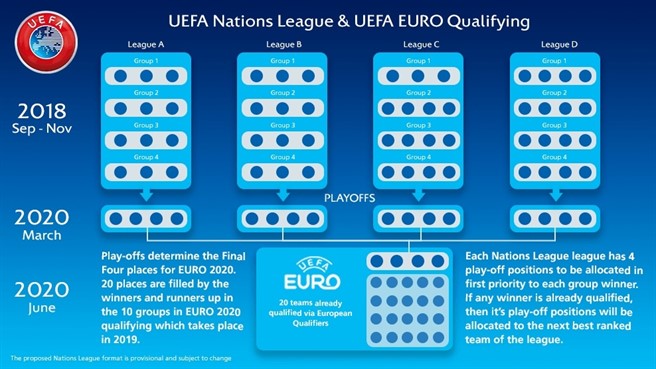
So Who Benefits From The New System?
Well, UEFA believe that everyone wins with their new format.
It’s probably fair to argue that nobody enjoys the meaningless friendlies. Coaches, fans, players, nobody. This system addresses that, although there will still be spaces in the calendar for some friendlies – especially prior to tournaments and so that you can play against non-European opposition.
So the higher ranked countries get the chance to play for a new trophy and some new gold, which I believe is a good thing. Given that promotion and relegation exists too, the teams involved will change over time also.
These higher ranked countries will also be playing teams of a better standard more regularly; again a good thing.
For the medium and lower ranked countries some of these will actually have a good chance of winning some games on a regular basis. No more getting spanked seven-nil each time San Marino run out.
UEFA believe that teams playing others of a similar standard will increase those standards of both teams, implying that everyone wins. How this pans out, of course, remains to be seen.
There is then a further golden egg for these teams given that at least one team ranked in the lowest sixteen will qualify for every major tournament. This is a wonderful incentive for those countries, even if they do nothing on the big stage.
You can read more of Ryan’s work here






















































